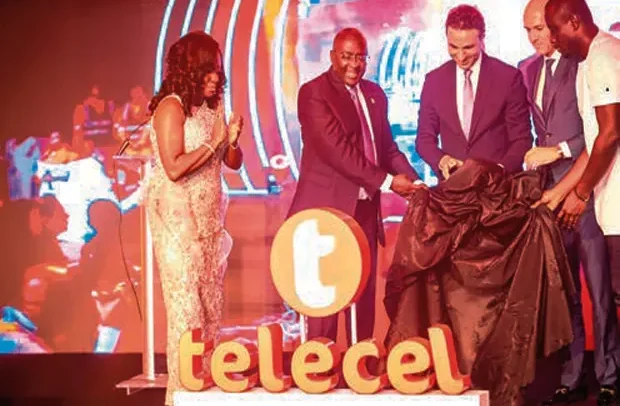

 This article is not about NPP or NDC government. It is about the Government of Ghana as a continuum and how the actions and inactions of policymakers and their implementing agencies have created the current status quo we have in the telecoms industry.
This article is not about NPP or NDC government. It is about the Government of Ghana as a continuum and how the actions and inactions of policymakers and their implementing agencies have created the current status quo we have in the telecoms industry.
The Government of Ghana used to own 100% of Ghana Telecom before 70% was sold to Vodafone for $900 million in 2006. Since then, government has always held 30% golden shares in what became Vodafone Ghana, and now Telecel Ghana. Similarly, through the Ghana National Petroleum Authority (GNPC), government established Westel in partnership with US-based Western Wireless. Westel then became Zain, and later Airtel. Over the transition period, government, through GNPC held some 35% golden shares in the company. Then when Airtel merged with Tigo to form AirtelTigo, government’s shares was reportedly recalibrated to 10%. But now government owns 100% of AirtelTigo (now AT Ghana), which it purchased for $1, after both Airtel (Bharti) and Tigo (Millicom) checked out of the Ghanaian market.
That is the simplest way I can put Ghana government’s involvement in the telecoms industry over the years. You can also read more about the evolvement of Ghana’s telecom industry in previous articles here and here.
But the elephant in the room that needs to be addressed is this; of what real value have all these government golden shares in these two telecom companies been to the telcos, given that, in spite of them being in bed with the government of Ghana (so to speak), they have been on the stretcher for many years now, and all efforts to save them recently, have proved too late, and completely futile.
Deriving from the big question, here are other begging questions:
- Is government really a partner to these two telcos in the real sense of the word, or government is rather a liability?
- Has government been a worthy partner to these telcos?
- What value has government’s shareholding in these two telcos for decades brought to the table in terms of their advancement or otherwise?
SMP could have been prevented
“Prevention is better than cure” is one of life’s simplest principles, but it seems to elude particularly African leaders. They always sit by and watch a flag become a situation, then turn into a pattern; moves on and becomes a problem, and they still wait for it to become a crisis before they begin to play macho and pretend to look for a cure.
In June 2020 (just four years ago), MTN Ghana was named a significant market power (SMP) as a prelude to implement measures to correct (cure) the huge market imbalance in the telecoms industry. But if you are a keen follower of the industry like I am, you would know that this current government is not entirely to blame for the status quo. In fact, if anything at all, this government is the first to have taken the bull by the horn and attempted to address the crisis decisively. The making of this market imbalance started about two decades ago, but the actions and inactions of successive governments and their agencies kept worsening it until it became the crisis we are seeing today.
The irony of this whole mess is that, during this entire period, the government of Ghana held its golden shares in the two telcos – Airtel and Vodafone, so one would have expected that government was going to act in its own interest, and prevented those two telcos from becoming nothings before MTN, without having to get to the point where government is now compelled to put the brakes on MTN just to save other telcos. One cannot fathom how government could just watch its interest in those two telcos drop to these shameful levels when it could have employed prudent and timely policy interventions to protect its interest and in the process save the entire industry from this quasi-monopoly we have on our hands.
Cash call
The little said about how government has handled its interest in Airtel and by extension AT Ghana the better. Let’s focus on Vodafone (now Telecel). For all the years Vodafone was here, successive CEOs of the company kept complaining that government’s 30% shareholding brought no value to the company, because when there is a cash call, government does not show up.
It is not clear how many times there were major cash calls when Vodafone was here, but at least this writer is aware of one occasion when the National Communications Authority (NCA) – a government institution – directed all telcos to invest in rolling out 3G nationwide within a given deadline. All the telcos, including Vodafone went to the international market and borrowed money for the purpose. One would have expected that government was going to cough up 30% of whatever was needed to do the nationwide 3G rollout, but no. Vodafone borrowed money and applied it the way they saw fit. Government had absolutely no say because they made no contributions. In the end, Vodafone spent a lot of that money for more marketing and branding ventures than rolling out the 3G network nationwide. They failed to meet the deadline, but they had enough money to bring in US R&B musician Trey Songz for a music event, and also brought one Amber Rose (who did not and still does not really mean anything to Ghanaians) to MC the event. All of these folks and other big ticket artistes were paid heavily just to put Vodafone out there as a premium (elitist) brand. Meanwhile, they failed to deliver on their mandate to go nationwide with 3G, and there were no sanctions by the NCA.
Airtel and Tigo also failed to meet the deadline. MTN on the other hand, met the deadline and in the process, raked in a whopping one million customers in just one year at the time. So, clearly, government’s involvement with the other telcos made no positive difference. MTN, which had no government interest, invested and met the deadline and the results showed. Government was and has always just been a free rider who contributes virtually nothing to those two telcos. And when those telcos fail to meet deadlines, they get away with it because they are in bed with government.
Licensing fees
Licensing fees occasion regular cash calls. The telcos are very often required to cough up cash and pay for spectrum to deploy higher technologies and offer better quality services. This is another avenue where government could and should have been a worthy partner. The oxymoron here is that the telecoms industry regulator, NCA, is a government institution which answers to the Communications Minister (the policymaker) and yet these two telcos in which government holds shares had a challenge acquiring spectrum to rollout 4G in 2015, and government did absolutely nothing to assist them. Does that even make sense? It is like the popular Ghanaian oxymoron, which says that “we are sitting by a lot of money but we are hungry”. Apologies to Nana Addo Dankwa Akufo-Addo. In other words, we have telcos who are partners of the government which controls the spectrum, and yet that same government could not help them to acquire the spectrum, due to some ridiculous technicalities.
The last time I raised the issue about why government could not use its 30% shares in Vodafone and 35% shares in Airtel (at the time) to assist the two telcos, and by extension, create a window for other smaller operators to also be helped to get the needed spectrum for 4G, I was told that the shares in the telcos were held under the auspices of the Ministry of Finance, whereas the license sale by NCA was under the auspices of the Ministry of Communications. So, the Finance Ministry would have to pay to the NCA on behalf of the two telcos. That, for me was one of the most ridiculous explanations ever. If the Finance Ministry pays money to NCA, is that money still not for government? So, what is wrong with the Finance Ministry asking the Communications Ministry to instruct the NCA to issue the licenses (spectrum) to the two telcos and then the two ministries will work out a payment plan to sort themselves out. Why do we make it look as if monies paid to the NCA is private funds. That thing has never made sense to me. After all, it is all government; and in doing so, they would have saved the two telcos and other smaller ones from collapse, protected governments interest in those telcos and also prevented the kind of market gap that led to naming MTN SMP and forcing them to burden Ghanaians with high data prices.
Suffocating tower cost
One other major pain area for the non-SMP telcos in Ghana is tower cost. Apart from MTN, all the other telcos and ISPs (internet service providers) owe tower companies like ATC Ghana and Helios Towers millions of dollars in monthly fees as well as utility and fuel bills. In fact, the smaller telcos actually have legacy debts that they are still paying off, while the recurrent bills also keep piling up. A lot of the ISPs have collapsed under the weight of these legacy tower debts. How government would hold 30% shares in Vodafone and 35% shares in Airtel and still sit by and watch all these costs to pile up is another thing that baffles my mind.
Interestingly, it was the government, through the NCA that made it compulsory for all operators to do tower co-location. Government policy gave birth to a tower company like ATC Ghana, which is now unplugging operators, including even Telecel Ghana for alleged indebtedness. In fact, government and the NCA sat by and watched the tower companies to operate a passive system where they charge their fees in spite of whether or not an operator is making money from a particular tower. Provided the equipment of the operators are on the premises of the tower, the companies charge their fees. Government could have moved in and protected its 30% and 35% interest by either paying those fees or crafting a policy that protects the industry from exploitation by the tower companies, instead of allowing them to make crazy profits off the industry, while the telcos in which government has interest suffocate to death.
Stay tuned for part two. It has some suggestions for government as a continuum.
By Samuel Dowuona
The post Elephant in the room: The government’s valueless golden shares in Telecel and AT Ghana – Part 1 appeared first on Ghana Business News.
Read Full Story





Facebook
Twitter
Pinterest
Instagram
Google+
YouTube
LinkedIn
RSS